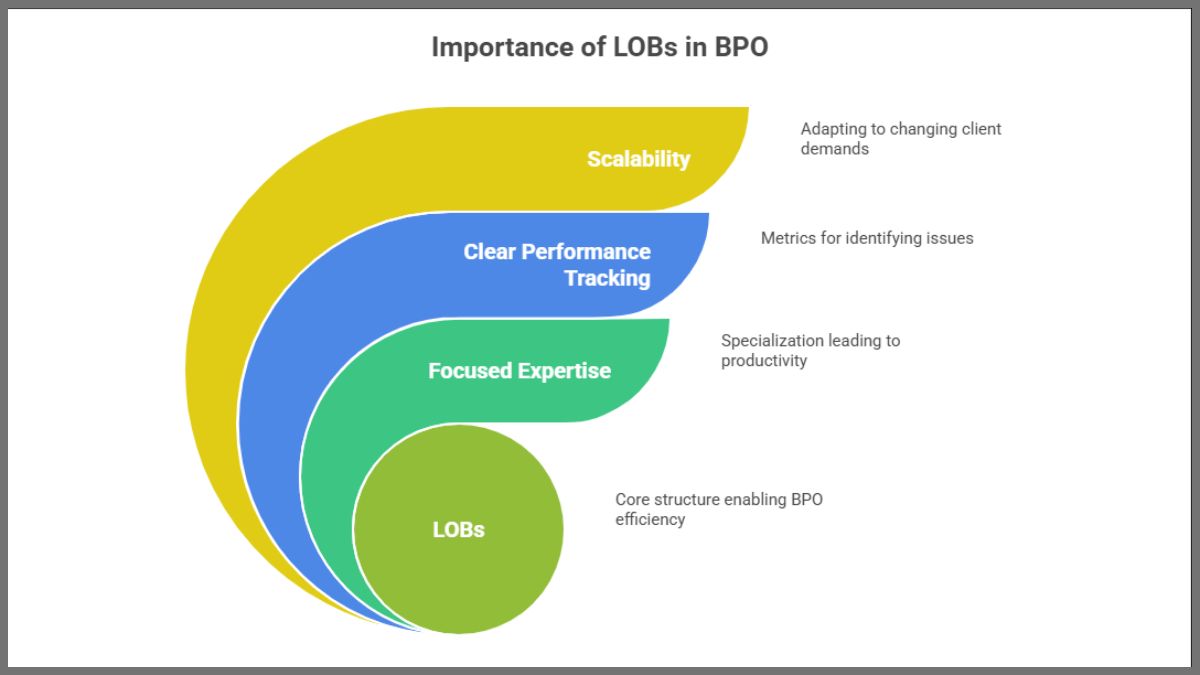Have you ever searched for the meaning of LOB in BPO while exploring the world of call centers or Business Process Outsourcing (BPO) industry and wondered what it means? If yes, you’re not alone. LOB is a commonly used industry term, but it’s not always clear to those who are new to BPO. In this blog post, we’ll break it down in simple terms, explain why it matters, and explore how it affects BPO operations today.
What Does LOB Mean in BPO?
LOB stands for Line of Business.
In the context of BPO, a Line of Business refers to a specific department, function, or service area that a BPO provider handles for their client. Each LOB is like a focused segment of operation, and it often has its own team, management, performance metrics, and goals.
For example, let’s say a large retail company hires a BPO provider to manage customer support, technical helpdesk, and back-office processing. Each of these services would be treated as a separate LOB.
Think of it Like a School
To make it easier, imagine a school with different classes: Math, Science, and English. Each class is taught by a different teacher and has its own goals and daily activities. Similarly, in BPO, each LOB operates independently to meet specific business objectives.
Common Types of LOBs in BPO
The BPO industry serves a wide range of industries, and therefore, the types of LOBs can vary depending on the client’s needs. Here are some typical examples:
- Customer support: Handling phone calls, emails, and chats from customers.
- Technical support: Assisting customers with technical issues, like software malfunctions or device troubleshooting.
- Sales and telemarketing: Making outbound calls to promote products or handle incoming sales inquiries.
- Back-office services: Data entry, invoice processing, payroll management, etc.
- Healthcare support: Insurance claims processing, patient record management, billing, and more.
Why Is LOB Important in BPO?
Good question! Understanding LOBs is key to understanding how BPO companies function effectively.
1. Focused Expertise
Each LOB allows agents and managers to specialize in a particular area. This results in better productivity and higher accuracy in problem-solving.
2. Clear Performance Tracking
BPOs use metrics like Average Handling Time (AHT), First Call Resolution (FCR), and Customer Satisfaction Scores (CSAT) to measure performance. Having separate LOBs makes it easier to track these stats, identify issues, and implement changes.
3. Scalability
As a business grows, its operations become more complex. BPO companies can easily scale each LOB independently based on client demand. For instance, if there’s a spike in customer queries during the holiday shopping season, the customer support LOB can bring in more staff accordingly.
Modern Trends Impacting BPO LOBs in 2025
The BPO industry is evolving rapidly, and LOBs are transforming alongside with it. Here are the top changes happening now:
1. Rise of AI and Automation
According to a 2024 report by Deloitte, nearly 78% of BPO companies are integrating AI-driven tools to improve efficiency within LOBs. For instance, chatbots now handle basic customer service requests, freeing up human agents for complex issues.
This trend is especially noticeable in LOBs covering customer support, where AI can handle repetitive inquiries like password resets and shipping updates.
2. Industry-Specific Customization
With increased demand for niche outsourcing, many BPOs are setting up industry-aligned LOBs. A healthcare LOB, for example, may include HIPAA-certified agents trained to handle sensitive medical data.
3. Data-Driven Decisions
LOBs are now heavily influenced by real-time analytics. Managers track data dashboards to identify bottlenecks in service and measure agent performance. These insights help in making data-driven improvements almost instantly.
4. Work-from-Anywhere Structures
Post-pandemic, remote work has become mainstream. LOBs today are designed to function just as well with remote teams. With cloud-based CRMs and communication tools like Zoom and Microsoft Teams, LOBs can remain productive regardless of location.
How Companies Benefit from Defining Clear LOBs
Clients hiring BPO services often expect high quality and fast results. Here’s how defining LOBs helps meet those expectations:
- Better transparency: Clients can easily understand how their services are managed and evaluated.
- Improved accountability: Each LOB has its own leadership, making it easier to identify responsibility.
- Customized service delivery: Operations can be tailored to meet the goals of a specific service area like billing or sales.
Examples of LOBs in Real-World BPO Operations
Let’s look at how major companies use LOBs in their BPO partnerships:
- Amazon: Outsources customer support, product listing management, and delivery complaint handling—each as a separate LOB.
- American Express: Works with BPO providers to manage different lines such as fraud monitoring, customer care, and back-office reporting.
- Telecom companies: Like AT&T and Sprint outsource LOBs for billing support, tech support, and retention programs.
All of these businesses benefit from LOB segmentation because it allows them to manage operations efficiently without compromising service quality.
Getting Started in a BPO LOB Role
If you’re considering a job in the BPO industry, knowing about LOBs can help you find the right fit. Some roles might be more customer-facing, while others focus on backend processes. Here’s what you can expect in different LOB roles:
- Customer Support LOB: Requires good communication skills and patience.
- Technical Support LOB: Involves problem-solving and tech know-how.
- Finance LOB: Values accuracy, spreadsheets skills, and data analysis.
It helps to assess your strengths and apply for an LOB that aligns with your skills and interests.
Final Thoughts: Why LOB Matters in Today’s BPO Environment
As BPO services become even more customized and technology-driven, understanding the concept of LOB in BPO is more important than ever—for clients looking to outsource and for professionals working in the industry.
Each LOB represents a well-structured, goal-oriented unit that makes large BPO operations manageable and efficient. With the rise of digital transformation, remote working, and customer-first strategies, the role of LOBs will only continue to grow in importance.
So, the next time you hear someone mention an LOB in a meeting or job posting, you’ll know exactly what they mean—and why it matters.
What are your thoughts? Have you worked in a specific LOB before or are you planning to start a career in BPO? Feel free to share your experience in the comments below!





